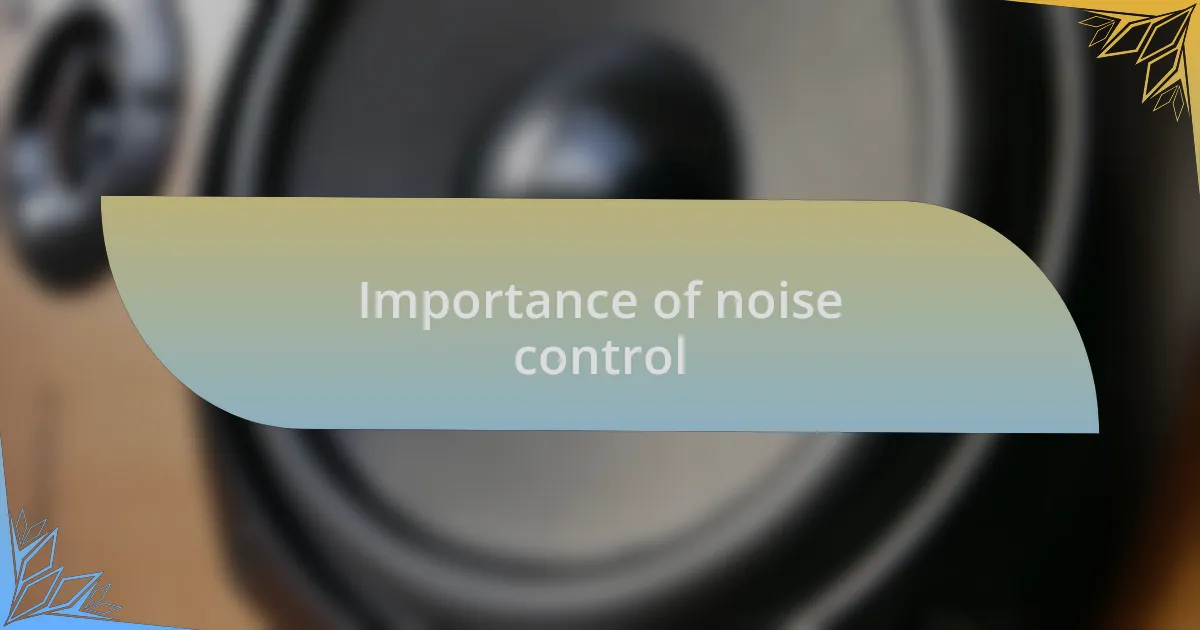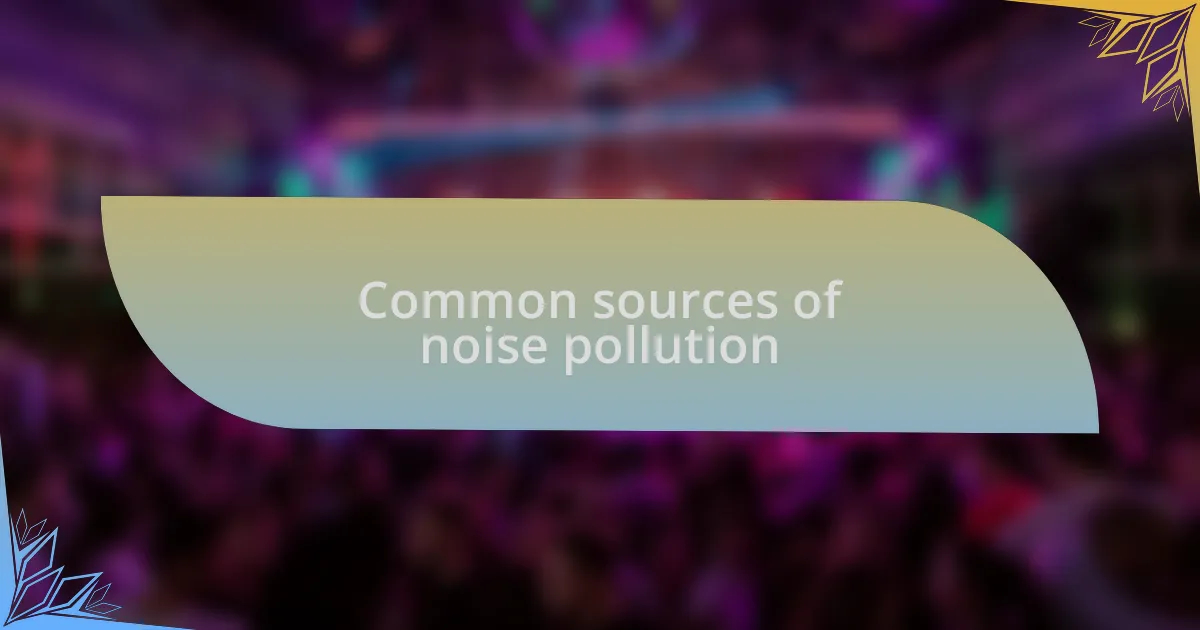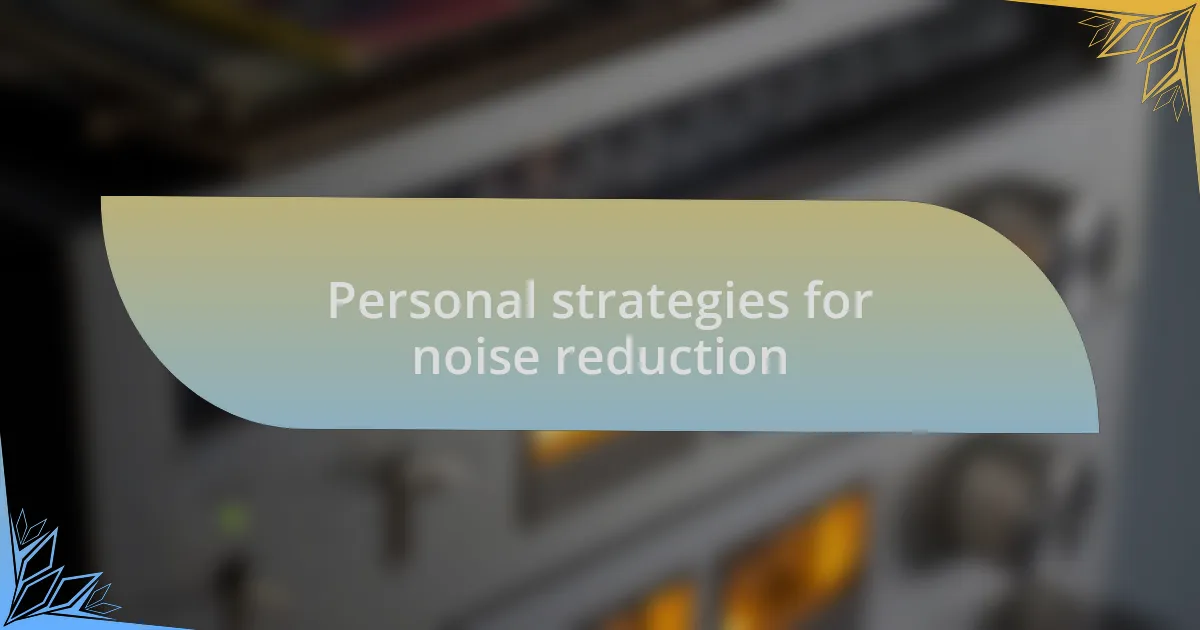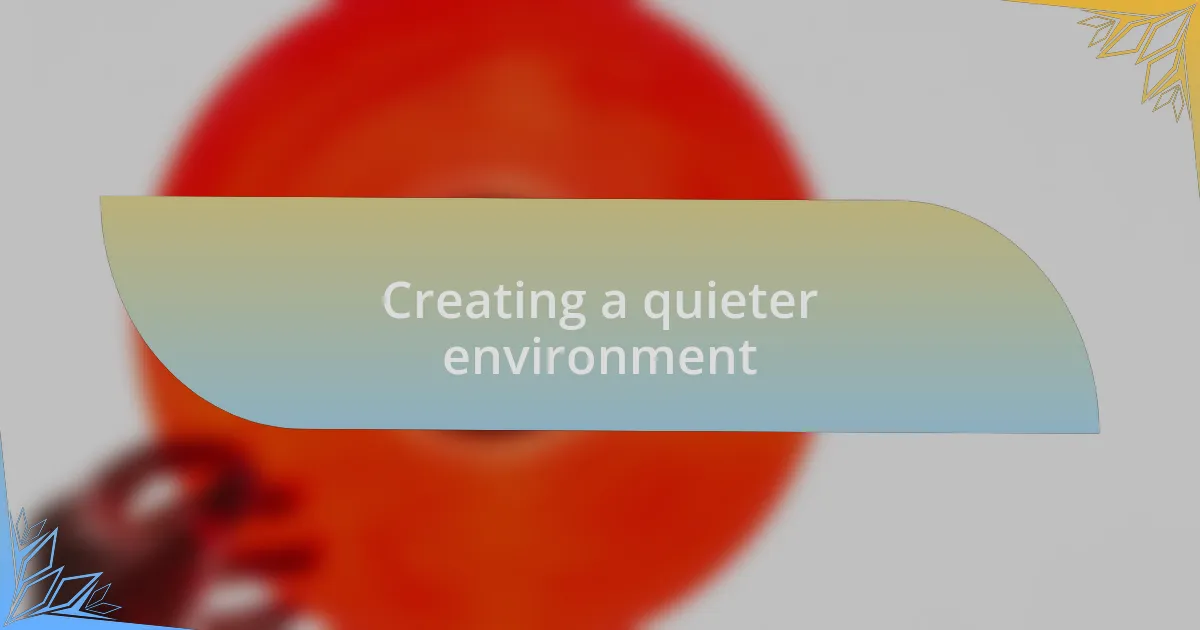Key takeaways:
- Sound pollution, stemming from sources like traffic and construction, significantly impacts mental health and productivity.
- Implementing noise control techniques, such as soundproofing and landscaping, can create quieter and more pleasant environments.
- Personal strategies like creating quiet spaces and using noise-canceling technology can effectively reduce distractions and enhance focus.
- Reducing sound pollution leads to improved mental health, productivity, and better interpersonal relationships.

Understanding sound pollution
Sound pollution, often referred to as noise pollution, is more than just an annoyance; it can significantly affect our quality of life. Have you ever tried to concentrate on a task while a lawnmower roars outside? I remember struggling to focus on work when my neighbor decided to tackle his weekend yard work just as I was in the zone. It’s moments like these that highlight how disruptive excessive noise can be.
This type of pollution can come from various sources, including traffic, construction, and even loud music. It’s essential to recognize that sound waves can affect our mental health, leading to stress and anxiety. For instance, I noticed that after a day in a particularly noisy café, I felt drained and irritable. It’s fascinating how sound can impact not just our ears but our entire state of being.
Recognizing sound pollution is the first step toward addressing it. Many of us may dismiss bothersome noise as a minor inconvenience, but I’ve learned that our bodies react to these disturbances in profound ways. Have you ever felt a headache approach after a lengthy exposure to loud sounds? Understanding how sound pollution operates can empower us to advocate for quieter spaces in our daily lives.

Importance of noise control
Noise control is crucial because it directly impacts our health and well-being. I remember a time when I moved into a bustling city neighborhood and was shocked at how little I slept due to constant street noise. This lack of sleep began to affect my mood and energy levels, making daily activities feel like a chore. Have you ever felt a similar strain from incessant background noise?
The importance of managing sound pollution extends to our productivity and overall performance. When I worked in an open office, the constant chatter and ringing phones made it challenging to concentrate on my tasks. I found myself daydreaming rather than focusing, which not only affected my work quality but also increased my stress levels. It’s clear that noise control is not just a matter of comfort; it’s vital for maintaining our efficiency and effectiveness.
Moreover, environments that prioritize noise control foster better relationships and social interactions. I once attended a dinner at a restaurant that was designed for acoustic comfort. The conversations flowed naturally without the stress of shouting over background noise. Doesn’t it feel wonderful when you can connect with others without distractions? Effective noise control can truly transform our social experiences.

Common sources of noise pollution
There are several common sources of noise pollution that many of us encounter daily. Traffic noise stands out, whether it’s the blaring horns during rush hour or the rumble of trucks passing by at night. I still recall a summer evening when my family and I tried to enjoy our backyard only to be interrupted by the constant sounds of cars zooming past, which made it hard to relax. Isn’t it frustrating when you just want to unwind but the world outside won’t let you?
Construction sites also contribute significantly to the cacophony around us. I remember living near a building project that seemed to go on forever; the sounds of drilling and hammering became a part of my everyday life. At first, I tried to ignore it, but eventually, the noise seeped into my thoughts, disrupting my focus during work and my peace during relaxation. Have you ever found it challenging to find solitude amidst ongoing construction?
Moreover, everyday household appliances can be surprisingly loud as well. I’ve had mornings where the whirring of the vacuum cleaner or the clattering of dishes drowned out my favorite music. While these sounds might seem harmless, they can build up over time, impacting our comfort and mental well-being. Isn’t it ironic how the devices meant to help us can also contribute to our stress?

Techniques for reducing sound pollution
One effective technique for reducing sound pollution is using soundproofing materials in homes and offices. I’ve installed acoustic panels in my workspace, and it made a noticeable difference. The once distracting echoes of nearby street noise faded into the background, allowing me to focus. Have you considered how simple changes like adding rugs or heavy curtains can soften sound in your environment?
Landscaping can also play a crucial role in noise reduction. I remember planting hedges around my yard, which not only enhanced privacy but also significantly decreased the noise from the street. The dense foliage acts as a natural barrier, absorbing sounds and creating a more tranquil outdoor space. Isn’t it amazing how nature can help us reclaim a sense of peace amidst the chaos of urban life?
Finally, strategic planning during construction can minimize noise disturbances. I’ve seen projects where builders scheduled noisy tasks during hours when most people were away at work. This kind of thoughtful scheduling demonstrates a commitment to community well-being. Have you noticed how respectful planning can foster goodwill even during necessary renovations? Each of these techniques can contribute to a quieter, more serene environment.

Personal strategies for noise reduction
When it comes to personal strategies for noise reduction, I’ve found that creating a dedicated quiet space can be transformative. In my home, I set up a small reading nook away from high-traffic areas, and it quickly became my sanctuary. With a comfortable chair and a few sound-absorbing elements, I’ve noticed how this little retreat helps me escape from the noise of daily life. Have you ever thought about how a specific area just for relaxation could enhance your peace of mind?
Another method I employ is prioritizing noise-canceling technology. Investing in a good pair of noise-canceling headphones was a game changer for me. During busy workdays, I can tune out distractions and immerse myself in my tasks without interruption. Have you experienced the difference that a little technology can make in reclaiming your focus?
I also advocate for mindfulness practices, like meditation or yoga, especially in a noisy environment. While at a bustling café, I often find myself plugging into a quick mindfulness routine. It not only helps me center my thoughts amidst the distractions around me but also equips me with tools to manage stress. Don’t you think integrating mindfulness into your daily life could help foster a more peaceful state, despite external noise?

Creating a quieter environment
Creating a quieter environment often starts with the spaces we inhabit. For me, arranging furniture in a way that promotes sound flow significantly reduces noise. I remember when I shifted my desk away from the wall—suddenly, the echoing sounds I barely noticed before became muffled, creating a more soothing workspace. Have you considered how the layout of your environment could impact your acoustic experience?
Another strategy I’ve embraced is the use of soft furnishings. I’ve found that adding rugs and plush throw pillows not only beautifies a room but also absorbs sound. Recently, I opted for a thick area rug in my living room, and it felt like a gentle hug for my ears. Isn’t it fascinating how a simple change can create a more peaceful atmosphere?
Lastly, I’ve discovered that plants can contribute to sound reduction. Having greenery around me not only makes my space feel alive but also helps to dampen noise. I placed a few larger plants by my window, and to my surprise, the combination of their soft leaves and the way they partially block outside noise made my home feel more serene. Have you thought about incorporating nature into your environment for both aesthetic and acoustic benefits?

Benefits of sound pollution reduction
Reducing sound pollution can significantly improve mental health. I recall a time after a long, noisy day, where I felt mentally drained and irritable. The simple act of retreating to a quieter space dramatically lifted my spirits. Isn’t it amazing how just a little less noise can rejuvenate our minds and enhance our overall well-being?
Another major advantage is improved focus and productivity. I’ve experienced this firsthand when working from home; reducing background noise led me to complete tasks more efficiently. This is especially crucial for those of us in creative fields, where uninterrupted thought can be the difference between a good idea and a great one. Have you noticed how distractions can hinder your flow?
Moreover, better sound control contributes to healthier relationships. I remember a fractious discussion with my partner that stemmed from exhaustive noise interference while trying to communicate. By minimizing disturbances, we found that not only did our conversations improve, but our connection deepened. Wouldn’t we all benefit from clearer communication in our daily interactions?